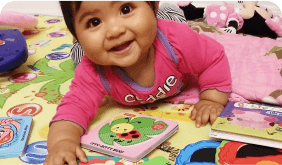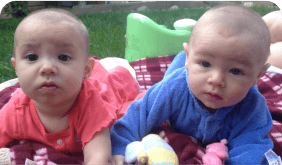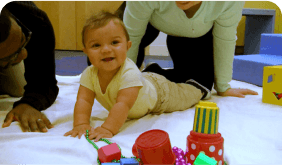Early Detection + Early Intervention = A Life Full of Possibilities
Early Detection + Early Intervention = Prevention
Baby’s early years are some of the most important for their development, which is why early detection and early intervention are so impactful.
Early intervention can look a little different depending on where you live and the level of intervention needed; there are lots options. Whether it be state funded programs, private therapy, or home activities there are lots of ways you can help get baby on the right track.
Find an Early Intervention Program in your state.
From birth to age three, Baby’s brain is like a sponge, ready to soak up new skills and build new neural pathways, known as neuroplasticity.
Because Baby’s brain is so flexible, this is a great time to guide their development. If you ever feel like Baby isn’t quite meeting their milestones or something feels “a little off.” Trust your instincts and with Baby’s healthcare provider. Early help can make a big difference!
Earlier is always better but it is never too late.
How Many Babies Are at Risk For a Delay?
Around 600,000 babies are born at risk for early delays each year, but fewer than 50% are identified early.
This is largely due to a lack of awareness about early warning signs and the importance of getting help early. Don’t worry, though—Pathways.org is here to help!

How to Help Identify Early Delays
Keep a notebook. Take note of any concerning or unusual behaviors and talk about them with Baby’s healthcare provider at well-baby checkups.
Use our free Baby Milestones App, checklists, brochures, and videos to track your child’s development (these are also great additions to bring to your well-baby check).
Don’t be afraid to be persistent. You know Baby best, so trust your instincts. If you have concerns, talk to Baby’s healthcare provider, seek out a second opinion or find a therapy clinic to get a free screening.
The goal of early detection is to help babies build a strong foundation for movement at the right stage of development. It’s much easier for babies to learn a movement correctly the first time than to try and correct it later. It takes 300-350 repetitions to build a new motor pattern, but re-training an atypical movement can take 3000-5000 repetitions.

So I Am Concerned…What Now?
The answer is early intervention. There are many activities, programs, and procedures that can benefit children who may need some extra help with their development. Some need to be provided by a healthcare professional but others are simple at-home activities and games you can do with Baby.
Here are some examples you can check out:
Create a FREE account on Pathways.org and download our App (link) for personalized games and activities for Baby’s age range
Explore (link to explore section) developmental topics and frequently asked questions

Early Intervention Programs With Healthcare Professionals
Additionally, state funded Early Intervention is a great service for children with developmental delays that provides therapy services in their natural environment (home, daycare, or other place they routinely spend time). Early Intervention is a federally mandated program that provides support and education to children with developmental delays and their families. Services include physical, occupational, feeding, and speech-language therapy. To find out more about your state’s Early Intervention program, go to the Center for Disease Control’s website.
Payment & Who Qualifies
Every state is different when it comes to which children and developmental concerns qualify. But generally, children ages 0-3 exhibiting delays in physical, cognitive, communication, and social/emotional development are eligible for services.
Some states offer free services, while other states have a sliding scale based on insurance. To find out more about your state’s requirements, go to the Center for Disease Control’s website.
Other Ways to Get Help
Just because your child doesn’t qualify for early intervention doesn’t mean Baby might not need extra help. Pediatric therapy clinics can be a wealth of knowledge and a great option for Baby. Most clinics offer free screenings and/or can give you at-home programs to help get Baby back on track. See how home programs work: Watch how baby bootcamp helped with Tummy Time.
A Hope for All Children
By encouraging early detection and early intervention, Pathways.org hopes all children can reach their fullest ability.
Remember, earlier is always better but it is never too late.





